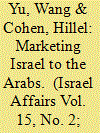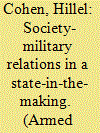| Srl | Item |
| 1 |
ID:
060486


|
|
|
|
|
| Publication |
Jan 2005.
|
| Summary/Abstract |
Using informers is a basic tool in preventing terror attacks and the nature of current terror threats makes it even more crucial. This use, however, often leads to human rights violations, both of the informers and by them, and to many problematic ethical questions. Drawing on the Israeli–Palestinian example—where a main strategy of Israeli intelligence activity in the Palestinian areas has been an extensive use of informers—this article presents the main human rights dilemmas in the field, divided into three stages: recruitment, operation and post-operation obligations, and also points to the possible counter-productive consequences of such a use.
|
|
|
|
|
|
|
|
|
|
|
|
|
|
|
|
| 2 |
ID:
087839


|
|
|
|
|
| Publication |
2009.
|
| Summary/Abstract |
Among multiple aspects of Israeli dominance over the Palestinians from
both sides of the Green Line, the ideological one appears as the single most
spectacular failure. Members of the Israeli establishment readily acknowledge
the notorious inefficiency of the Israeli public relations campaign in
Arabic.1 Although the Israeli Broadcast Authority (IBA) maintains radio
and TV broadcasts-and even attempted for a short while to launch a
Middle East Satellite Channel (2002-2005)-the overall impact of these
efforts on shaping Palestinian or, more generally, Arab public opinion
is negligible.2 The reasons for this failure are not difficult to assess: even
for the most sophisticated public relations campaign it would be difficult
to market Israel to the hostile Palestinian and Arab audience, particularly
to those who are direct victims of either occupation or discrimination.
But does this mean that efforts to present Israeli viewpoints to the Arab
public are meaningless and intrinsically doomed? To examine this
supposition, this article will analyze one of the most interesting attempts
of the Israeli authorities to communicate with the Palestinians through a
printed medium: the first seven years of the seventeen-year long life of
al-Anbaa (The News) newspaper (1968-1985).
|
|
|
|
|
|
|
|
|
|
|
|
|
|
|
|
| 3 |
ID:
119461


|
|
|
|
|
| Publication |
2013.
|
| Summary/Abstract |
Fatah activists in Jerusalem did not initiate suicide attacks during the second intifada (which began autumn 2000), as opposed to Hamas activists in the city and Fatah activists all over the West Bank and Gaza. I suggest that one of the main reasons for this unique behavior is the tradition of the joint non-violent Palestinian-Israeli struggle in the city against the Israeli occupation and the settlement project, which was the strategic choice of Fatah leadership in Jerusalem under Faisal Husseini since the mid-1980s. I argue that it is not the contact between Israelis and Palestinians by itself that has led the latter to avoid killing civilians, and some of the former to refuse serving in the Israeli army, but the joint vision of the relation between the two people.
|
|
|
|
|
|
|
|
|
|
|
|
|
|
|
|
| 4 |
ID:
114028


|
|
|
|
|
| Publication |
2012.
|
| Summary/Abstract |
The participation of the Palestinian Authority's (PA's) security agencies in the armed struggle against Israel in the second Palestinian uprising (2000-2005) is analyzed in this article as a response to the demand of Palestinian society, thus as a unique case of armed forces which, in the lack of political directive, became more attentive to public opinion. The article shows how Palestinian public discourse in the late 1990s-early 2000s, that was shaped by the Islamic movement of Hamas, portrayed the PA's security officials as traitors. Members of the PA security agencies (mainly Fatah members) sought to reposition themselves in the "national camp," and this motivated them to raise their weapons against Israeli targets. By doing so, they also removed the mental burden of turning their weapons against fellow Palestinians that was one of the major sources for their image as collaborators.
|
|
|
|
|
|
|
|
|
|
|
|
|
|
|
|